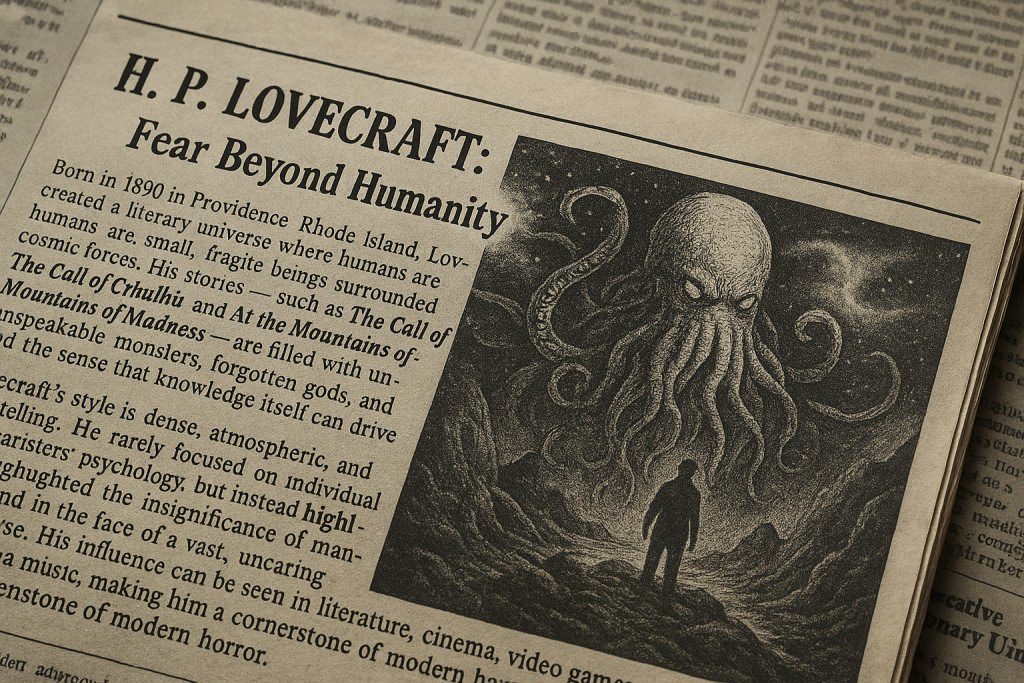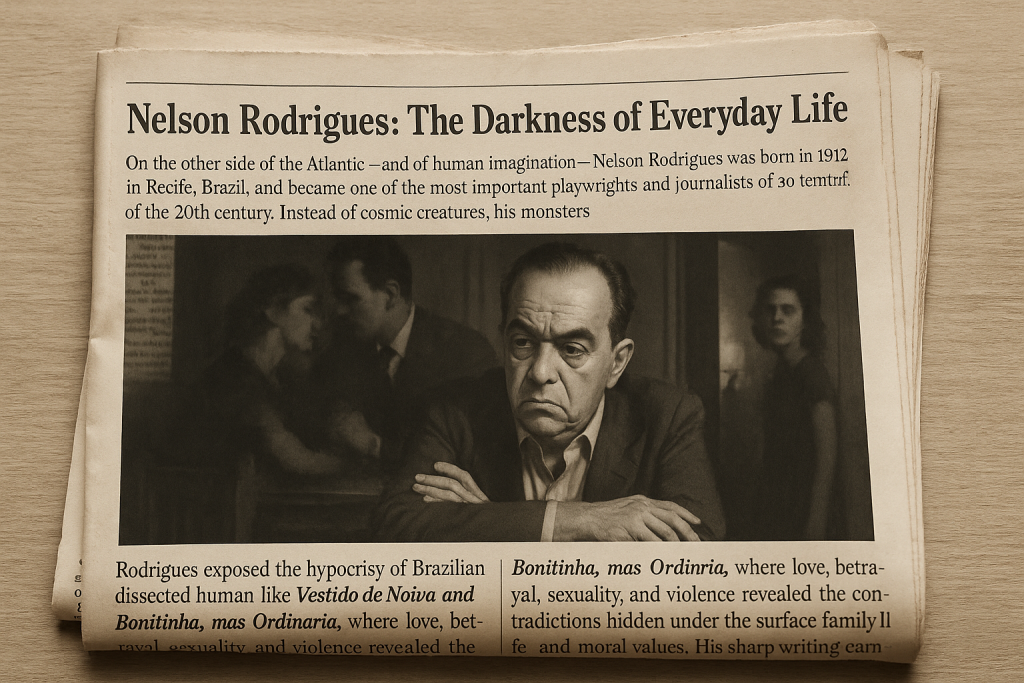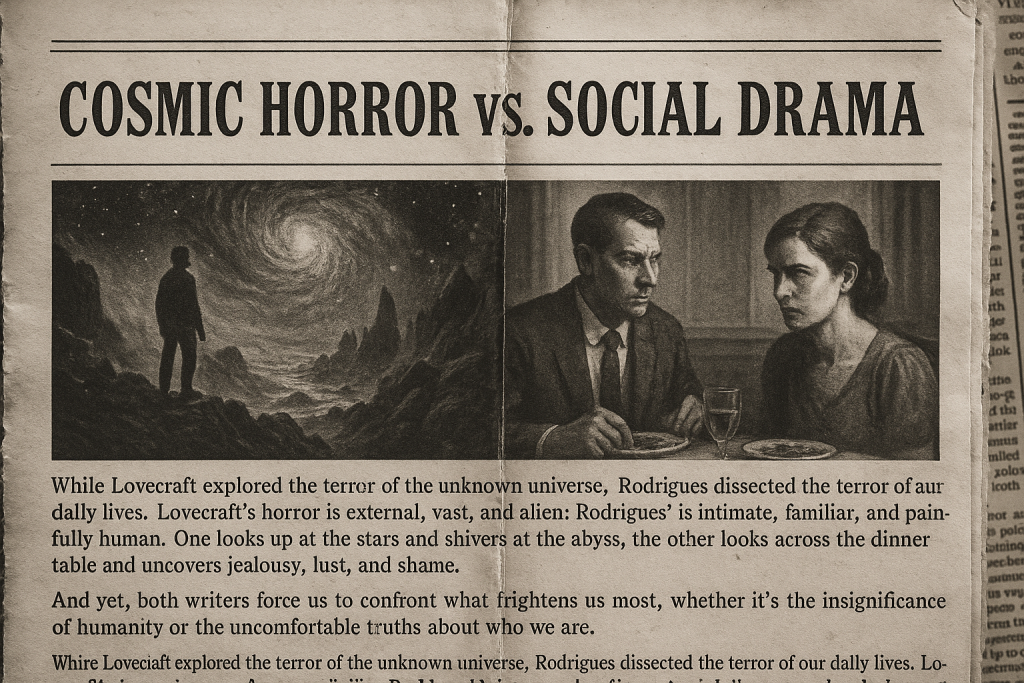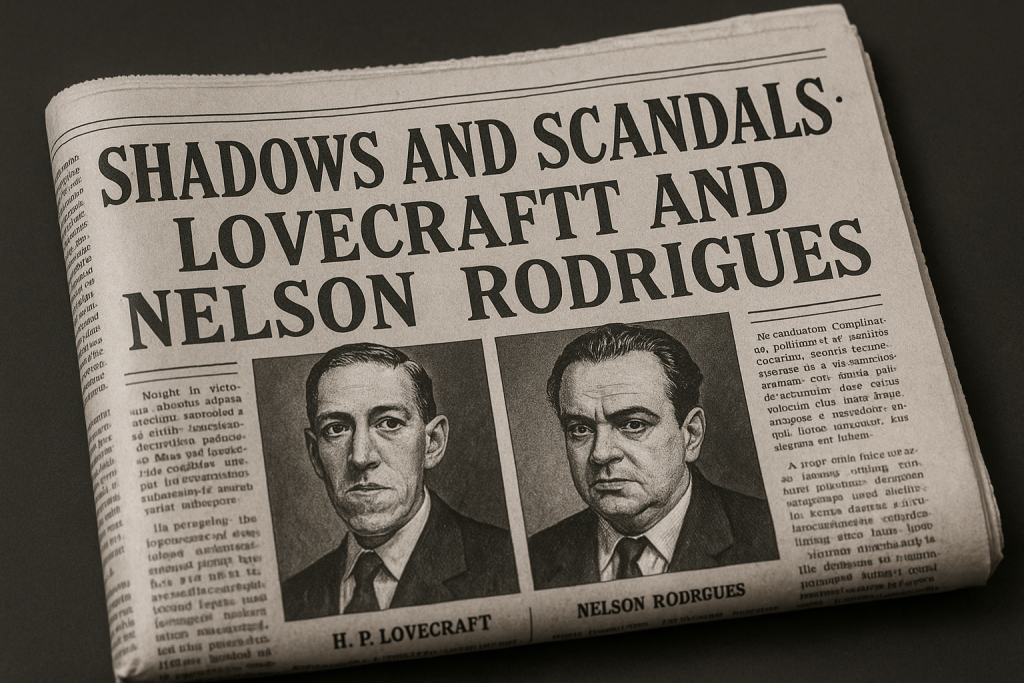Introdução
Do outro lado do oceano e do imaginário humano, dois escritores revelaram sombras que muitos preferiam não enxergar: H. P. Lovecraft, com seus horrores cósmicos e inumanos, e Nelson Rodrigues, com seus escândalos íntimos e tão humanos.
Ambos cutucaram feridas, expuseram tabus e mostraram que a literatura pode ser tanto um espelho quanto um abismo. No post de hoje, viajamos entre monstros ancestrais e segredos de família para entender como esses dois gênios, em contextos tão diferentes, dialogam com o medo — e como isso pode enriquecer seu inglês.
📖 Aqui você encontra…
clique para verNível:
B2–C1 (Intermediário-avançado a avançado)
Objetivo:
Conectar literatura brasileira e americana para refletir sobre como o medo, os tabus e a linguagem moldam sociedades, enquanto exploramos vocabulário literário e cultural em inglês.
Tópicos gramaticais abordados nesse texto:
-
Contrastive Structures: para comparações, como “Lovecraft’s horror is external, while Rodrigues’ is intimate.”
-
Past Simple: para biografias e contextos históricos, como “Rodrigues was born in 1912.”
-
Complex Sentences with Conjunctions: como “Though they wrote in different times, both exposed fears.”
-
Abstract Vocabulary: termos como hypocrisy, insignificance, taboos, abyss.
-
Reporting and Descriptive Language: útil para crítica literária e cultural.
Shadows and Scandals: Lovecraft and Nelson Rodrigues
Every culture has its writers who look at the world and reveal the things most people would rather not face. This week, we celebrate two of them: the American master of cosmic horror, H. P. Lovecraft, and the Brazilian playwright and chronicler of human desire, Nelson Rodrigues.
Though they wrote in different times and places, both left deep marks on literature by exposing the hidden fears, scandals, and taboos of their societies.
H. P. Lovecraft: Fear Beyond Humanity
 Born in 1890 in Providence, Rhode Island, Lovecraft created a literary universe where humans are small, fragile beings surrounded by incomprehensible cosmic forces. His stories — such as The Call of Cthulhu and At the Mountains of Madness — are filled with unspeakable monsters, forgotten gods, and the sense that knowledge itself can drive us to madness.
Born in 1890 in Providence, Rhode Island, Lovecraft created a literary universe where humans are small, fragile beings surrounded by incomprehensible cosmic forces. His stories — such as The Call of Cthulhu and At the Mountains of Madness — are filled with unspeakable monsters, forgotten gods, and the sense that knowledge itself can drive us to madness.
Lovecraft’s style is dense, atmospheric, and unsettling. He rarely focused on individual characters’ psychology, but instead highlighted the insignificance of mankind in the face of a vast, uncaring universe. His influence can be seen in literature, cinema, video games, and even music, making him a cornerstone of modern horror.
Nelson Rodrigues: The Darkness of Everyday Life
 On the other side of the Atlantic — and of human imagination — Nelson Rodrigues was born in 1912 in Recife, Brazil, and became one of the most important playwrights and journalists of the 20th century. Instead of cosmic creatures, his monsters were human.
On the other side of the Atlantic — and of human imagination — Nelson Rodrigues was born in 1912 in Recife, Brazil, and became one of the most important playwrights and journalists of the 20th century. Instead of cosmic creatures, his monsters were human.
Rodrigues exposed the hypocrisy of Brazilian society through plays like Vestido de Noiva and Bonitinha, mas Ordinária, where love, betrayal, sexuality, and violence revealed the contradictions hidden under the surface of family life and moral values. His sharp writing earned him the title “the man who showed Brazil to itself,” even as many accused him of scandalizing the nation.
Cosmic Horror vs. Social Drama
 While Lovecraft explored the terror of the unknown universe, Rodrigues dissected the terror of our daily lives. Lovecraft’s horror is external, vast, and alien; Rodrigues’ is intimate, familiar, and painfully human. One looks up at the stars and shivers at the abyss; the other looks across the dinner table and uncovers jealousy, lust, and shame.
While Lovecraft explored the terror of the unknown universe, Rodrigues dissected the terror of our daily lives. Lovecraft’s horror is external, vast, and alien; Rodrigues’ is intimate, familiar, and painfully human. One looks up at the stars and shivers at the abyss; the other looks across the dinner table and uncovers jealousy, lust, and shame.
And yet, both writers force us to confront what frightens us most, whether it’s the insignificance of humanity or the uncomfortable truths about who we are.
Why Read Them in English?

For students of English, diving into Lovecraft can be a challenge, but also a rewarding way to build vocabulary and explore the gothic style of early 20th-century literature. Reading about Nelson Rodrigues in translation, meanwhile, allows us to see how Brazilian culture is represented abroad and how his themes resonate universally.
By comparing these two authors, learners can expand not only their language skills but also their cultural understanding — seeing how literature from different corners of the world reflects humanity’s deepest fears.
Get to know Apollo!
Quer aprender inglês de forma dinâmica, conectando o idioma com cultura, história e curiosidades do mundo? Entre em contato com a Apollo English Academy e descubra como podemos transformar seu aprendizado em uma jornada envolvente e eficaz.
